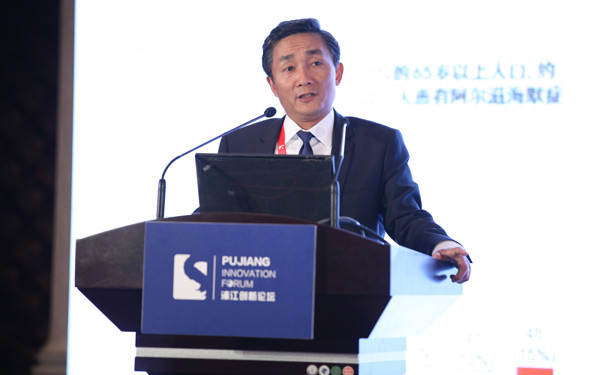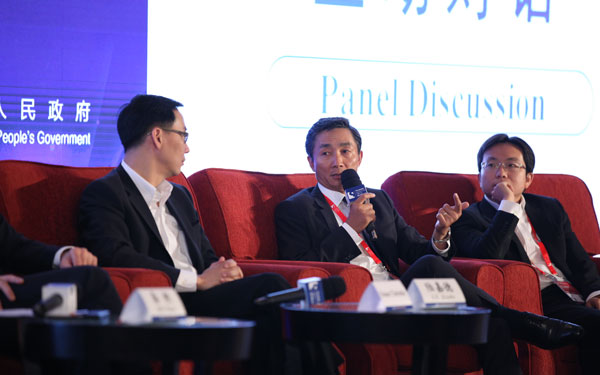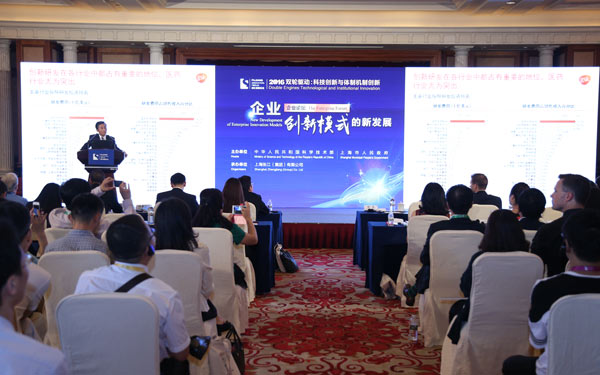GSK strengthens China R&D commitment
(chinadaily.com.cn) Updated: 2016-10-09 14:11
 |
|
Li Min, GSK’s global head of neuro sciences and general manager of R&D in China, delivers a speech at the Enterprise Forum, an event during the 2016 Pujiang Innovation Forum on Sept 25, 2016. [Photo provided to chinadaily.com.cn] |
GlaxoSmithKline, the UK healthcare company, will continue to strengthen its commitment to research and development in China to better serve Chinese patients and patients around the world.
"In the field of neurological diseases, we are very much committed to neurodegeneration and neuroexcitation," said Li Min, GSK's global head of neurosciences and general manager of R&D China.
"In medicine, you need to stay focused. You have to commit to one direction and make it happen," Li said.
 |
|
Li Min joins the panel discussion at the Enterprise Forum, an event during the 2016 Pujiang Innovation Forum on Sept 25, 2016. [Photo provided to chinadaily.com.cn] |
The company has invested heavily in neuroscience research in China in the past few years. In 2015, it launched Neuro2020, a project aimed at strengthening partnerships with universities in order to convertthe best neuroscience research into products on the market, thereby benefiting patients.
"Neuro 2020 is a program to interact with Chinese universities, research organizations and biotech. We believe great science is not limited inside an organization but around the world," Li said. "It is a part of our five-year plan to establish both our research as well as connectivity to the rest of our ecosystem, especially in China."
The company is working with four leading universities in China, according to Li.
"We believe there is great science in China with clearpotential for drug development," he said.
 |
|
Li Min delivers a speech at the Enterprise Forum, an event during the 2016 Pujiang Innovation Forum on Sept 25, 2016. [Photo provided to chinadaily.com.cn] |
GSK has established a headquartersfor neuroscience research and development in Shanghai to deal with related matters in an effective and efficient manner.
Li said the decisionmaking processat the Shanghai headquarters is one of the key advantages that separates GSK's R&D center from those of other companies.
In addition to having the power to decide on research and development processes, the headquarters plays a key role in attracting global talent, according to Li.
"Outstanding leaders in science hope to work in a place where they have a high probability of contributing to something that makes a real difference. By setting up our R&D structure in this way, we are committed not only to patients in China but also to talent in China," Li said.
Meanwhile, GSK's research and development centers in Philadelphia, San Diego, and London will continue to provide support to Shanghai's research base.
With more than 70 years' experience working in antibiotics and an active pipeline in the area, GSK is keen to provide support to China's public health development.
GSK announced in March it will form a new public health institute in Beijing to help China tackle the health threats posed by antibiotic resistance and infectious diseases.
The Institute for Infectious Diseases and Public Health aims to create sustainable, affordable treatment options for patients in China by aligning GSK's R&D capabilities in infectious diseases with the country's public health interests, and will act as a focal point for academics, government, healthcare providers and regulators, according to the company.
- Surge in P2P scams leads to stronger supervision
- Companies from 30 nations to attend industrial expo in Guangzhou
- GSK strengthens China R&D commitment
- Shanghai adopts measures to control surging home prices
- Chinese railway builders help locals along African railway
- Highlights of Barcelona Games World Fair
- China biggest Dubai trade partner in H1 2016
- Chinese steel won't impact EU market: official


















